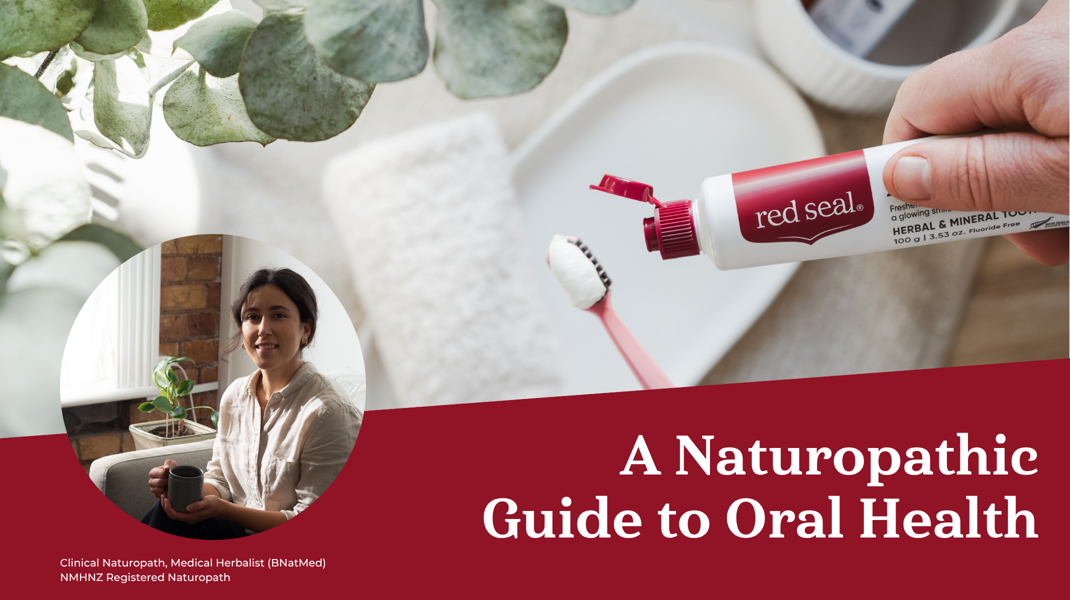A Naturopathic Guide to Oral Health

Oral health plays a key role in our overall well-being, yet it’s often overlooked. The mouth is home to one of the most diverse microbiomes in the human body, with around 700 species of bacteria living in the oral cavity. It ranks second only to the large intestine in microbial complexity. Nurturing your oral health from a naturopathic perspective involves more than just brushing and flossing. It means choosing whole foods that support a healthy microbiome, incorporating antibacterial herbal remedies, and creating daily rituals that leave your mouth feeling clean and fresh.
Oral Health and Overall Well-being
Oral health conditions are among the most common health concerns worldwide. Diet and daily oral care both play a crucial role in maintaining the health of teeth and gums. Certain bacteria in the mouth are known to negatively impact the oral environment by feeding on leftover food particles, particularly from sugar and refined carbohydrates. These foods create the perfect environment for these acid-producing bacteria to flourish. When these bacteria ferment food particles, they produce acids that lower oral pH, which can weaken tooth enamel and contribute to decay and gum issues. Choosing a balanced diet and reducing foods high in sugar and refined carbohydrates helps create a healthier environment in the mouth, supporting strong teeth and gums.
Nutrition and the Oral Microbiome
A nutrient-rich diet plays a vital role in supporting oral health. Key minerals like calcium and phosphorus help maintain strong bones, strengthening enamel and supporting remineralisation of teeth. In addition, foods rich in polyphenols, natural plant compounds with antioxidant and anti-inflammatory properties, offer further benefits. Sources include blueberries, blackcurrants, red cabbage, purple sweet potatoes, green tea, and extra virgin olive oil. The compounds in these foods help protect gum tissue, balance the oral microbiome, and reduce harmful bacteria in the mouth.
Polyphenols in foods also act as prebiotics, feeding beneficial bacteria and supporting the oral microbiome. In the mouth, they have been shown to inhibit bacterial adhesion and reduce biofilm formation. Some research also suggests that the beneficial bacteria Lactobacillus reuteri, found naturally in the oral cavity and gastrointestinal tract, may be supportive of oral health. This bacterial species produces antimicrobial compounds such as reuterin and has been shown to inhibit harmful bacteria while also exerting anti-inflammatory effects. Fermented foods such as sauerkraut, kefir, and kimchi are often high in lactobacillus species, and are a great addition to a healthy diet.
Herbal Toothpaste and Oral Care
Natural oral care products often draw on the wisdom of traditional herbal medicine. Did you know that throughout history, many cultures have used the twigs of trees to clean their teeth? This is due to their natural abrasiveness, but also due to their anti-microbial, anti-inflammatory, and astringent properties. The leaves and bark of trees often possess essential oils that stimulate circulation, along with tannins that have an astringent effect to help tighten and cleanse the gums.
Many essential oils are used in Red Seal’s natural toothpastes, such as eucalyptus, peppermint, and mānuka. The leaves of the eucalyptus trees are rich in essential oils and tannins, which help cleanse and tone the gums, making them excellent ingredients in modern herbal toothpaste. Peppermint is another key ingredient for oral health as it contains menthol, known to promote fresh breath. One of my personal favourites is the Red Seal Whitening Toothpaste, largely because it features the New Zealand native, mānuka, known for supporting overall gum health. Many of these herbal extracts have been valued for centuries and continue to promote oral health today, leaving your mouth feeling naturally clean and fresh.
Additional Naturopathic Tips
Incorporating gentle, daily practices can go a long way in maintaining oral health while supporting the mouth’s delicate ecosystem. These include brushing twice daily with a soft-bristle brush, using natural antibacterial toothpastes, and flossing to remove plaque between teeth. Oil pulling with coconut oil in the morning may further support oral hygiene, while rinsing with warm salt water can gently aid the healing of any irritation in the mouth.
Staying well hydrated is also essential, as saliva helps buffer acids and maintain a healthy pH balance in the mouth. A diet based on whole foods, rich in minerals, polyphenols, and probiotics, also nourishes both the oral and digestive microbiomes. Since the mouth is the beginning of the digestive tract, caring for it is one of the first steps in supporting the health of your whole body.
References available upon request. This blog shares personal experiences and perspectives. It’s not intended as individual advice, always check with your own naturopath, GP or healthcare provider for any health-related decisions.



